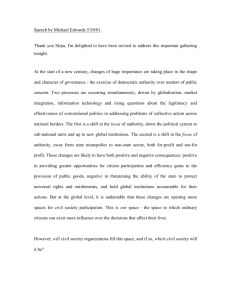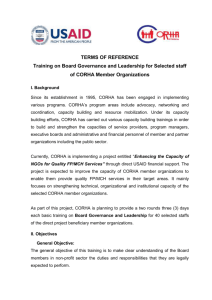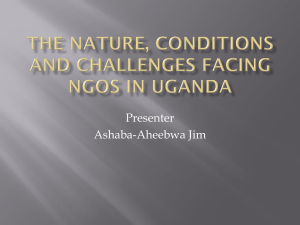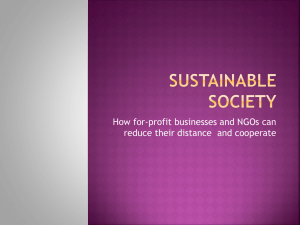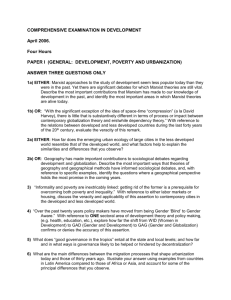Fall 2009 NGOs, Civil Society, and Global Governance Instructor
advertisement
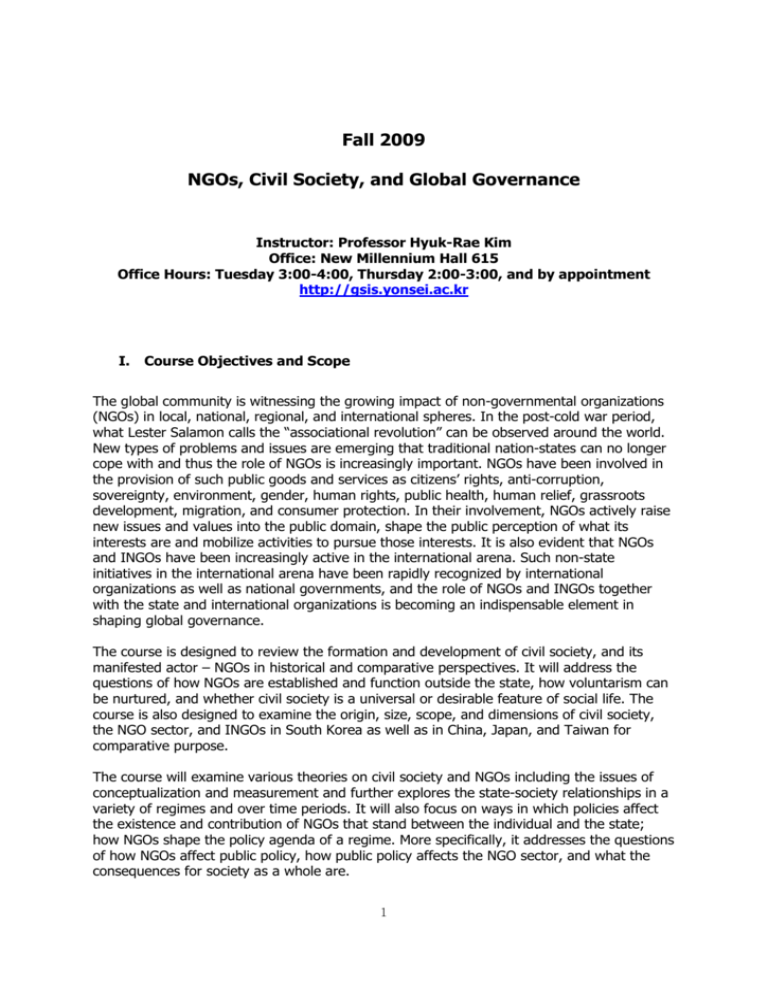
Fall 2009 NGOs, Civil Society, and Global Governance Instructor: Professor Hyuk-Rae Kim Office: New Millennium Hall 615 Office Hours: Tuesday 3:00-4:00, Thursday 2:00-3:00, and by appointment http://gsis.yonsei.ac.kr I. Course Objectives and Scope The global community is witnessing the growing impact of non-governmental organizations (NGOs) in local, national, regional, and international spheres. In the post-cold war period, what Lester Salamon calls the “associational revolution” can be observed around the world. New types of problems and issues are emerging that traditional nation-states can no longer cope with and thus the role of NGOs is increasingly important. NGOs have been involved in the provision of such public goods and services as citizens’ rights, anti-corruption, sovereignty, environment, gender, human rights, public health, human relief, grassroots development, migration, and consumer protection. In their involvement, NGOs actively raise new issues and values into the public domain, shape the public perception of what its interests are and mobilize activities to pursue those interests. It is also evident that NGOs and INGOs have been increasingly active in the international arena. Such non-state initiatives in the international arena have been rapidly recognized by international organizations as well as national governments, and the role of NGOs and INGOs together with the state and international organizations is becoming an indispensable element in shaping global governance. The course is designed to review the formation and development of civil society, and its manifested actor – NGOs in historical and comparative perspectives. It will address the questions of how NGOs are established and function outside the state, how voluntarism can be nurtured, and whether civil society is a universal or desirable feature of social life. The course is also designed to examine the origin, size, scope, and dimensions of civil society, the NGO sector, and INGOs in South Korea as well as in China, Japan, and Taiwan for comparative purpose. The course will examine various theories on civil society and NGOs including the issues of conceptualization and measurement and further explores the state-society relationships in a variety of regimes and over time periods. It will also focus on ways in which policies affect the existence and contribution of NGOs that stand between the individual and the state; how NGOs shape the policy agenda of a regime. More specifically, it addresses the questions of how NGOs affect public policy, how public policy affects the NGO sector, and what the consequences for society as a whole are. 1 The course will also discuss the concept of global governance and examine some of the central features of contemporary global governance including the role of the state and of international organizations and the emergence of global civil society. In relation to the issue of global governance, the class will focus on key issues and trends in the areas of migration, human rights and refugees, and environment in collaboration with other institutions and networks. The objective of the course is to help students develop and deepen an understanding of the followings: the concept and nature of civil society, NGOs, globalization, and global governance; the historical and comparative perspectives of civil society, NGOs, and governance; how patterns of governance have changed and are changing in an era of globalization. In order to answer the above, you need to think critically, rigorously, and theoretically; locate and synthesize needed information from a wide range of resources. II. Course Requirements and Grading This class will be run as a seminar so that you are expected to do the required reading before the class in which we will be discussing it. Each student will be required to complete two short papers: the first one is a short (10 typed pages with double-space) case analysis of a NGO in a particular country of the East Asian region (Korea, China, Taiwan, and Japan). You need to select at least one national representative NGO and address the following basic issues: historical origin, major campaigns or activities, alliance networks, institution building, policy proposals and impact, societal influence, and so on. The other one is an analysis of a chosen topic (for example, migration, human rights, environment, human relief, public health) listed in the syllabus. Your topic analysis paper should also be typed in less than 10 pages. You are required to address how civil society, NGOs, INGOs, and the state interact to govern the chosen issue. The instructor must approve topics and will also suggest some possibilities, as well as help indentifying sources of information. Students with special interests on topics, countries, or cultures that are not covered on the list, or who wish to delve more fully into any of the topics covered in the list should consult with me. There are four major requirements for the course, each of which will contribute to the overall course grade in the proportions indicated: Class attendance and participation (5 percent), class presentation (10 percent), one or two review papers (10 percent), case paper and theme-based topic paper (40 percents), and final examinations (35 percents). In this semester, you need to have the following class presentations: review paper, case study, and topic analysis. Review Papers You are required to write one or two brief (from five to seven pages) review papers on the readings each week. The group of three to five students will be expected to prepare a short (five to seven pages) review paper on weekly assigned readings. Each group is required to give a 20 minute class presentation and then lead a 20-30 minute class discussion. The number of review paper presentation will be determined according to the class enrollment size. 2 These papers should include a few paragraph statements of what you believe are the key argument(s) of each article followed by a reaction to the main point. Review can be comments in agreement, critiques, disagreements with the main points, and / or questions that come to mind as you read. Review papers will not be graded, but they count towards your final grade. Writing review that reflects your thoughts about the course material is one of the most valuable learning tools in this course. It will help you integrate readings, lectures, discussions and project assignments and prepare you for active class participation. Review papers should address the following questions: What is the main point and argument of the article or chapter? What are the underlying assumptions? What evidence is provided to support the argument? What are the implications of the argument? What are some possible counter-arguments? Case Study/ Topic Analysis Presentation and Class Discussion In the third week of the semester, each student will choose the topic and subsequent case study. Students are required to give a 30 minute in-class group presentation and then lead a 20-30 minute class discussion. The goal of the discussion is to examine how the topic relates to and illustrates key course themes and readings. For class presentation on your case study, you need to select one extra reading (preferably a case study). Reading should be given out one week in advance to facilitate discussion. Four or five questions should also be prepared in advance that will guide the discussion. Submit your case and topic no later than Week 3. Presentation dates will be arranged according to how topics fit with the weekly sessions. Class Participation The course requires active participation in discussions and critical reflection and assessment of the course material. While quantity matters, participation grades ultimately will be based on the quality of your participation. Therefore, you should be prepared to discuss the main points of the readings, ask questions, provide constructive feedback, and generate and share critical perspectives. There is an additional requirement that will be factored into your participation grade. Some weeks you will be assigned specific articles to read. You must participate actively and constructively in class discussions. This means not only attending class, but also demonstrating that you have read the assigned material prior to the class and that you are able to reflect on them constructively. Required Reference Most, if not all, of the articles can be found through the electronic resources such as JSTOR of the Yonsei University library. They have already been uploaded onto YSCEC. All the other reading are compiled as a reading package available at the Copy Center. The following required references are being hold at the GSIS library. 3 Fisher, Julie. 1998. Non-Governments: NGOs and the Political Development of the Third World. West Hartford, Connecticut: Kumarian Press. Cohen, Jean L. and Andrew Arato. 1992. Civil Society and Political Theory. Cambridge: MIT Press. Armstrong, Charles K., ed. 2002. Korean Society: Civil Society, Democracy and the State. London: Routledge. References Powell, Walter W. and Richard Steinberg, eds. 2006.The Nonprofit Sector: A Research Handbook, 2nd Edition. Yale University Press. Heins, Volker. 2008. Nongovernmental Organizations in International Society: Struggles over Recognition. Palgrave Macmillan. Ahmed, Shamina and David Potter. 2003. NGOs in International Politics. Kumarian Press. Feher, Michel, ed. 2007. Nongovernmental Politics. Zone Books. Edwards, Michael. 2004. Civil Society. Polity Press. Della Porta, Donatella, and Mario Diani. 2006. Social Movements: An Introduction. Oxford, U.K.: Blackwell. Jordan, Lisa and Peter van Tuijl, eds. 2006. NGO Accountability: Politics, Principles and Innovations. Earthscan. Keck, Margaret E. and Kathryn Sikkink. 2002. Activists beyond Borders. Ithaca: Cornell University Press. Salamon, Lester, S. Wojciech Sokolowski and Regina List. 2003. Baltimore: Johns Hopkins University. Putnam, Robert D.1993. Making Democracy Work. Princeton University Press. Fukuyama, Francis. 1995. Trust. Free Press. Ehrenberg, John. 1999. Civil Society: The Critical History of Idea. NYU Press. Harvey, David. 2005. A Brief History of Neoliberalism. New York: Oxford University Press. Mattli, Walter and Nqaire Woods, eds. 2009. The Politics of Global Regulation. Princeton University Press. Hasan, Samiul and Jenny Onyx, eds. 2008. Comparative Third Sector Governance in Asia. Springer. Ray, Marcella Ridlen.2002. The Changing and Unchanging Face of U.S. Civil Society. New Brunswick: Transaction Publishers. South Korea Rho Han-Kyun. 2007. Shareholder Activism: Corporate Governance Reforms in Korea. Palgrave Macmillan. Park, Tae-Kyu, et al. 2004. “South Korea,” pp. 200-213 in Global Civil Society: Dimensions of the Nonprofit Sector. Bloomfield, CT: Kumarian Press. Kim, Inchoon and Changsson Hwang. 2002. “Defining the Nonprofit Sector: South Korea.” Working Papers of the Johns Hopkins Comparative Nonprofit Sector Project, no. 41. Baltimore: The John Hopkins Center for Civil Society Studies. Kim, Hyuk-Rae. 2002. "NGOs in Pursuit of ‘the Public Good’ in South Korea," pp. 58-74 in Collective Goods,Collective Futures in Asia, edited by Sally Sargeson. London: Routledge. Koo, Hagen. 2002. “Engendering Civil Society: The Role of the Labor Movement,” pp. 109 -131 in Korean Society: Civil Society, Democracy and the State, edited by Charles K. Amstrong. London: Routledge. Clark, Donald N. 2002. “Protestant Christianity and the State: Religious Organizations as Civil Society,” pp. 187-206 in Korean Society: Civil Society, Democracy and the State, edited by Charles K. Amstrong. London: Routledge. 4 Coleman, John A., S.J. 2002. “A Limited State and a Vibrant Society: Christianity and Civil Society,” pp. 223-254 in Civil Society and Government, edited by Nancy L. Rosenblum and Robert C. Post. Princeton: Princeton University Press. Stackhouse, Max L. 2002. “Christianity, Civil Society, and the State: A Protestant Response,” pp. 255-264 in Civil Society and Government, edited by Nancy L. Rosenblum and Robert C. Post. Princeton: Princeton University Press. China Ma, Qiusha. 2009. Non-Governmental Organizations in Contemporary China: Paving the Way to Civil Society? London: Routledge. Weller, Robert P. 1999. Alternative Civilities: Democracy and Culture in China and Taiwan. Westview Press. Xiaoguang, Kang and Feng Li. 2006.”NGO Governance in China: Achievements and Dilemmas,” pp. 129-163 in NGO Accountability: Politics, Principles and Innovations, edited by Lisa Jordan and Peter van Tuijl. Earthscan. Lee, Eliza W. Y. 2005. “Nonprofit Development in Hong Kong: The Case of a StatistCorporatist Regime.” Voluntas 16 (1): 51-68. Ma, Quisha. 2002. “Defining Chinese Nongovernmental Organizations.” Voluntas 13 (2): 113-130. Chen, Jie. 2001. “Burgeoning Trans-nationalism of Taiwan’s Social Movement NGOs.” Journal of Contemporary China 10 (29): 613-644. Saich, Tony. 2000. Globalization, Governance, and the Authoritarian State: China, pp. 208228 in Governance in a Globalizing World, edtied by Joseph S. Nye and John D. Donahue. Washington D.C.: Brookings Institution Press. Japan Pekkanen, Robert. 2006. Japan’s Dual Civil Society: Members without Advocates. Standford University Press. _____. 2000. “Japan’s New Politics: The Case of the NPO Law.” Journal of Japanese Studies 26 (1): 111-143. Schwartz, Frank and Susan Pharr, eds. 2003. The State of Civil Society in Japan. Cambridge: Cambridge University Press. Osborne, Stephen P., ed. 2003. The Voluntary and Non-Profit Sector in Japan: The Challenge of Change. New York: RoutledgeCurzon. Tadashi, Yamamoto, ed. 1999. Deciding the Public Good: Governance and Civil Society in Japan. Tokyo: Japan Center for International Exchange. Stockwin, J.A.A. 2005. “Governance, Democracy, and the Political Economy of the Japanese State,” pp. 54-70 in Contested Governance in Japan: Sites and Issues, edited by Glenn D. Hook.RotuledgeCurzon. Yutaka, Tsujinka. 2003. “From Developmentalism to Maturity: Japan’s Civil Society Organizations in Comparative Perspective,” in The State of Civil Society in Japan, edited by Frank Schwartz and Susan Pharr. Cambridge: Cambridge University Press. Makoto, Iokibe. 1999. “Japan’s Civil Society: An Historical Overview,” in Deciding the Public Good: Governance and Civil Society in Japan. Tokyo: Japan Center for International Exchange. Tadashi, Yamamoto. 1999. “Emergerence of Japan’s Civil Society and its Future Challenges,” in Deciding the Public Good: Governance and Civil Society in Japan. Tokyo: Japan Center for International Exchange. 5 Week 1 Civil Society: Concept and Measurement Hall, John A. 1995. “Chapter 1: In Search of Civil Society,” in Civil Society: Theory, History, Comparison. Polity. Walzer, Michael. 1991. “The Idea of Civil Society.” Dissent, Spring: 293-304. Misztal, Barbara A. 2004. “Civil Society: A Signifier of Plurality and Sense of Wholeness,” pp. 73-85 in The Blackwell Companion to Sociology, edited by Judith R. Blau. Blackwell Publishers. Foley, Michael and Bob Edwards. 1996. “The Paradox of Civil Society.” Journal of Democracy 7 (3): 38-52. Alexander, Jeffry. 1997. “The Paradox of Civil Society.” International Sociology 12: 115-133. Anheier, Helmut K. 2004. “Measuring Civil Society: Why and How,” pp.1-13 in Civil Society: Measurement, Evaluation, Policy, edtied by Helmut K. Anheier. Earthscan Publications Ltd. _____. 2004. “Indicators, Data, Process,” pp.84-106 in Civil Society: Measurement, Evaluation, Policy, edtied by Helmut K. Anheier. Earthscan Publications Ltd. Cohen, Jean and Andrew Arato. 2002. “Part I: The Discourse of Civil Society,” pp. 29-176 in Civil Society and Political Theory. Cambridge: MIT Press. Week 2 Civil Society in Historical Perspective Nosco, Peter. 2002. “Confucian Perspectives on Civil Society and Government,” pp. 334-359 in Civil Society and Government, edited by Nancy L. Rosenblum and Robert C. Post. Princeton: Princeton University Press. Madsen, Richard. 2002. “Confucian Conceptions of Civil Society,” pp. 190-204 in Alternative Conceptions of Civil Society, edited by Simone Chambers and Will Kymlicka. Princeton: Princeton University Press. Rosemont, Henry Jr. 2002. “Commentary and Addenda on Nosco’s “Confucian Perspectives on Civil Society and Government”,” pp. 360-369 in Civil Society and Government, edited by Nancy L. Rosenblum and Robert C. Post. Princeton: Princeton University Press. Week 3 Korea Kim, Hyuk-Rae. 2007. “The Making of Civil Society in Historical Perspective,” pp. 205-225 in Modern Korean Society: Its Development and Prospect, edited by Hyuk-Rae Kim and Bok Song, eds. Berkeley: Institute of East Asian Studies, University of CaliforniaㆍBerkeley. Chung, Chai-sik. “Korea’s Initial Search for Civil Society: Problems of Perception and Adaptation,” in Proceedings of the 5th Colloquium of the European-North American Committee for Cooperation in East Asia Studies, University of Motreal. Cho, Hein. 1997. “The Historical Origin of Civil Society in Korea.” Korea Journal 37 (2). Han, Sang-jin. 1997. “The Public Sphere and Democracy in Korea: A Debate on Civil Society.” Korea Journal 37 (4). Duncan, John. 2002. “The Problematic Modernity of Confucianism: The Question of “Civil Society” in Choson Dynasty Korea,” pp. 36-56 in Korean Society: Civil Society, Democracy and the State, edited by Charles K. Amstrong. London: Routledge. Kim, Sangjun. 2002. “The Genealogy of Confucian Moralpolitik and Its Implications for Modern Civil Society,” pp. 57-91 in Korean Society: Civil Society, Democracy and the State, edited by Charles K. Amstrong. London: Routledge. Bidet, Eric. 2002. “Explaining the Third Sector in South Korea.” Voluntas 13 (2): 131-147. 6 Week 4 NGOs, NPOs, and INGOs Boris, Elizabeth T. and C. Eugene Steuerle. 2006. “Scope and Dimensions of the Nonprofit Sector,” pp. 66-88 in The Nonprofit Sector: A Research Handbook, 2nd Edition. Yale University Press. Salamon, Lester M. and Helmut K. Anheier. 1996.”Chapter 1: Introduction,” pp. 1-22 in The Emerging Nonprofit Sector: An Overview. Manchester: Manchester University Press. Wolch, Jennifer R. 1990. “Building the Shadow State,” pp. 21-44 in The Shadow State: Government and Voluntary Sector in Transition. New York: The Foundation Center. Pearce, Jenny. 2000. “Development, NGOs, and Civil Society: The Debate and Its Future,” pp. 15-43 in Development, NGOs, and Civil Society, edited by Deborah Eade. Oxford: An Oxfam Publication. Petras, James. NGOs: In the Service of Imperialism, Journal of Contemporary Asia 29 (4): 429-441. Boli, John. 2006. “International Non-governmental Organizations,” pp. 333-353 in The Nonprofit Sector: A Research Handbook, 2nd Edition. Yale University Press. Week 5 Global Civil Society Kaldor, Mary. 2003. “The Idea of a Global Civil Society.” International Affairs 79 (3): 583593. Corry, T. Olaf. 2006. “Global Civl Society and Its Discontents.” Voluntas 17: 303-324. Salamon, Lester M., S. Wojciech Sokolowski, and Regina List. 2004. “Global Civil Society: An Overview,” pp. 2-60 in Global Civil Society: Dimensions of the Nonprofit Sector. Bloomfield, CT: Kumarian Press. Amoore, Louise and Paul Langley. 2004. “Ambiguities of Global Civil Society.” Review of International Studies 30: 89-110. Anheier, Helmut K. 2007. “Reflections on the Concept and Measurement of Global Civil Society.” Voluntas 18: 1-15. Week 6 Civil Society and NGOs in Comparative Perspective Salamon, Lester M., Helmut K. Anheier, and Associates. 2003. “Civil Society in Comparative Perspective,” pp. 3-39 in Global Civil Society: Dimensions of the Nonprofit Sector, edited by Lester M. Salamon et al. The Johns Hopkins University Press. Anheier, Helmut K. and Lester M. Salamon. 2006. “The Nonprofit Sector in Comparative Perspective,” pp. 89-115 in The Nonprofit Sector: A Research Handbook, 2nd Edition. Yale University Press. Brown, David L., Sanjeev Khagram, Mark H. Moore, and Peter Frumkin. 2000. Globalization, NGOs, and Multisectoral Relations, pp. 271-296, in Governance in a Globalizing World, edtied by Joseph S. Nye and John D. Donahue. Washington D.C.: Brookings Institution Press. Lee, Sook-Jong and Celeste Arrington. 2008. “The Politics of NGOs and Democratic Governance in South Korea and Japan.” Pacific Focus 33(1): 75-96. He, Baogang. 1999. “The Role of Civil Society in Defining the Boundary of a Political Community: The Cases of South Korea and Taiwan.” Asian Studies Review 23 (1): 27-48. Week 7 Theory on Civil Society Cohen, Jean and Andrew Arato. 1992. “Social Theory and Civil Society/ Social Movements 7 and Civil Society,” pp. 421-563 in Civil Society and Political Theory. Cambridge: MIT Press. Baynes, Kenneth. 2002. “A Critical Theory Perspective on Civil Society and the State,” pp. 123-145 in Civil Society and Government, edited byNancy L. Rosenblum and Robert C. Post. Cambridge: Princeton University Press. White, Stephen K. 2002. “Skeptics and the Celebration: Civil Society and the Early Frankfurt School,” pp. 146-150 in Civil Society and Government, edited by Nancy L. Rosenblum and Robert C. Post. Princeton: Princeton University Press. Week 8 Theory on NGO/NPO Steinberg, Richard. 2006. “Economic Theories of Nonprofit Organizations,” pp. 117-139 in The Non-Profit Sector: A Research Handbook, 2nd Edition, edited by Walter W. Powell and Richard Steinberg. Yale University Press. DiMaggio, Paul J. and Helmut K. Anheier. 1990. “The Sociology of Nonprofit Organizations and Sectors.” Annual Review of Sociology 16. Douglas, James. 1987. “Political Theories of Nonprofit Organizations,” in The Nonprofit Sector: A Research Handbook, edited by Walter W. Powell. Yale University Press. Clemens, Elisabeth S. 2006. “The Construction of Citizens: Political Theories of Nonprofit Organizations,” pp. 207-220 in The Non-Profit Sector: A Research Handbook, 2nd Edition, edited by Walter W. Powell and Richard Steinberg. Yale University Press. Gronbjerg, Kirsten A. 1998. “Markets, Politics, and Charity: Nonprofits in the Political Economy,” pp. 137-150 in Private Action and the Public Good, edited by Walter W. Powell and Elisabeth S. Clemens. Yale University Press. Young, Dennis R. 1998. “Government Failure Theory.” The International Encyclopedia of Public Policy and Administration, edited by Jay Shafritz. Westview Press. _____. 1998. “Contract Failure Theory.” The International Encyclopedia of Public Policy and Administration, edited by Jay Shafritz. Westview Press. Week 9 Governance Theory Ostrower, Francie and Melissa M. Stone. 2006. “Governance: Research Trends, Gaps, and Future Prospects,” pp. 612-628 in The Non-Profit Sector: A Research Handbook, 2nd Edition, edited by Walter W. Powell and Richard Steinberg. Yale University Press. Peters, B. Guy, 2000. “Governance and Comparative Politics,” pp. 36-53 in Debating Governance: Authority, Steering, and Democracy, edited by Jon Pierre. Oxford: Oxford University Press. Kooiman, Jan. 2000. “Societal Governance: Levels, Modes, and Orders of Social-Political Interaction,” pp. 138-164 in Debating Governance: Authority, Steering, and Democracy, edited by Jon Pierre. Oxford: Oxford University Press. _____. 2003. “Interactions, Governance and Governability,” pp. 211-230 in Governing as Governance. London: Sage Publications Ltd. Week 10 Globalization and Global Governance Halliday, Fred. 2004. “Global Governance: Prospects and Problems,” pp. 489-499 in The Global Transformation Reader, edited by David Held and Anthony McGrew. Polity Press. Jan Aart Scholte. 2005. “Chapter 2: Defining Globalization,” pp. 49-84 in Globalization: A Critical Introduction. Palgrave Mcmillan. _____. 2005. “Chapter 4: Explaining Globalization,” pp. 121-154 in Globalization: A 8 Critical Introduction. Palgrave Mcmillan. _____. 2005. “Chapter 6: Globalization and Governance: From Statism to Polycentrism,” pp. 185-223 in Globalization: A Critical Introduction. Palgrave Mcmillan. B. Guy Peters. 2000. “Globalization, Institutions, and Governance,” pp. 29-57 in Governance in the Twenty-first Century, edited by B. Guy Peters and Donald J. Savoie. Montreal & Kingston: McGill-Queen’s University Press. Rosenau, James N. 2000. “Change, Complexity, and Governance in Globalizing Space,” pp. 167-200 in Debating Governance: Authority, Steering, and Democracy, edited by Jon Pierre. Oxford: Oxford University Press. Hewson, Martin and Timothy J. Sinclair. 1999. “The Emergence of Global Governance Theory,” pp. 3-22 in Approaches to Global Governance Theory, edited by Martin Hewson and Timothy J. Sinclair. Albany: State University of New York Press. Week 11 Transnational Activism and Social Movements Smith, Jackie, Ron Pugnucco, and Charles Chatfield. 1997. "Social Movements and World Politics: A Theoretical Perspective," pp. 59-80 inTransnational Social Movements and Global Politics: Solidarity Beyond the State, edited by J. Smith, C. Chatfield, and R. Pugnucco. Syracuse, NY: Syracuse University Press. Keck, Margaret E. and Kathryn Sikkink. 2002. “Chapter 1: Transnational Advocacy Networks in International Politics: An Introduction,” in Activists beyond Borders. Ithaca: Cornell University Press. Week 12 Migration Schuerkens, Ulrike. 2005. “Transnational Migrations and Social Transformation: A Theoretical Perspective.” Current Sociology 53 (4): 535-553. Tamas, Kristof and Joakim Palme, ed. 2006. Globalizing Migration Regimes: New Challenges to Transnational Cooperation. Ashgate. Kim, Hyuk-Rae. 2009 “Contested Governance in the Making of Multicultural Societies: Labor Migration and International Marriages in South Korea.” Korea Observer 40 (2): 273300. Kim, Hyuk-Rae and Ingyu Oh. 2009. “Aspiring to be Global: Migration and Multicultural Contention in Japan, Korea, and Taiwan,” under review for the Journal of Ethnic and Migration Studies. Kim, Joon K. 2005. “State, Civil Society, and International Norms: Expanding the Political and Labor Rights of Foreigners in South Korea.” Asian and Pacific Migration Journal 14 (4): 383-418. Lim, Timothy C. 2003. “Racing from the Bottom in South Korea?: The Nexus between Civil Society and Transnational Migrants.” Asian Survey 43 (3): 423-442. Ryuhei, Hatsuse. 2005. “Governance, Asian Migrants and the Role of Civil Society,” pp. 152173 in Contested Governance in Japan: Sites and Issues, edited by Glenn D. Hook. RotuledgeCurzon. Week 13 Environment Clark, William C. 2000. “Environmental Globalization,” pp 86-108 in Governance in a Globalizing World, edtied by Joseph S. Nye and John D. Donahue. Washington D.C.: Brookings Institution Press. 9 Wapner, Paul. 1997. “Governance in Global Civil Society,” pp. 65-84 in Global Governance: Drawing Insights from the Environmental Experience, edited by Oran R. Young. Cambridge: The MIT Press. Keck, Margaret E. and Kathryn Sikkink. 2002. “Chapter 4: Environmental Advocacy Networks,” in Activists beyond Borders. Ithaca: Cornell University Press. Kim, Hyuk-Rae. 2007 “Globalization, NGOs, and Environmental Governance in Northeast Asia.” Korea Observer 38 (2): 285 – 311. Miranda A. Schreurs. 2005. “Japan and Global Environmental Governance,” pp. 133-151 in Contested Governance in Japan: Sites and Issues, edited by Glenn D. Hook. RotuledgeCurzon. Ho, Peter. "Greening With Conflict? Environmentalism, NGOs and Civil Society in China." Development and Change 32 (2001): 893-921. Week 14 Human Rights The 1990s saw a historic growth of NGOs in general, with a notable explosion of international and domestic human rights organizations. Hafner-Buron, Emilie M. and Kiyoteru Twutsui. 2004. “Human Rights in a Globalizing World: The Paradox of Empty Promises.” American Journal of Sociology 110 (5): 1373-1411. McCorquodale, Robert and Richard Fairbrother. 1999. “Globalization and Human Rights.” Human Rights Quarterly 21 (3): 735-766. *Suhajda, Eva Viraq. 2008. Non-Governmental Organizations and the Global Refugee Regime: The Role of NGOs n the Era of Global Governance. Kim, Hyuk-Rae. 2006 “Transnational Network Dynamics of NGOs for North Korean Refugees and Human Rights.” Korea Observer 37 (1): 57-92. Keck, Margaret E. and Kathryn Sikkink. 2002. “Chapter 3: Human Rights Advocacy Networks in Latin America,” in Activists beyond Borders. Ithaca: Cornell University Press. Week 15 NGO Accountability In the past decade, NGOs have come under heavy criticism, with claims that they often lack the legitimacy and transparency that they are known to loudly demand from governments and the private sector. This section addresses key theoretical questions of NGO accountability, including the sources from which NGO’s legitimacy is drawn and determined, and the range of legal and regulatory frameworks currently in place domestically, regionally, and internationally. Jordan, Lisa and Peter van Tuijl. 2006. “Rights and Responsibilities in the Political Landscape of NGO Accountability: Introduction and Overview,” pp. 3-20 in NGO Accountability: Politics, Principles and Innovations, edited by Lisa Jordan and Peter van Tuijl. Earthscan. Charnovitz, Stephen. 2006. “Accountability of Nongovernmental Organizations in Global Governance,” pp. 21-42 in NGO Accountability: Politics, Principles and Innovations, edited by Lisa Jordan and Peter van Tuijl. Earthscan. Hetty Kovach, Hetty. 2006. “Addressing Accountability at the Global Level: The Challenges Facing International NGOs,” pp. 195-210 in NGO Accountability: Politics, Principles and Innovations, edited by Lisa Jordan and Peter van Tuijl. Earthscan. 10 Citing Your Sources No matter where your information comes from, you always need to cite your sources. The most frequently used citations have been compiled by the reference librarians on a webpage and handout (APA, MLA and Chicago). APA: Publication Manual of the American Psychological Association, 5th ed. Washington, DC: APA, 2001. MLA: Gibaldi, Joseph. MLA Handbook for Writers of Research Papers. 6th ed. New York: Modern Language Association of America, 2003 Chicago: The Chicago Manual of Style, 15th ed. Chicago: University of Chicago Press, 2003 Professional Associations on NGO & NPO ARNOVA: Association for Research on Nonprofit Organizations and Voluntary Action – www.arnova.org. AOM: The Academy of Management – www.aomonline.org ISTR: International Society for Third-Sector Research – www.istr.org NACC: Nonprofit Academic Centers Council – www.naccouncil.org Alliance for Nonprofit Management – www.allianceonline.org Independent Sector – www.indepdendentsector.org Action Without Borders – www.idealist.org Academic Journals Nonprofit and Voluntary Sector Quarterly Voluntas: International Journal of Nonprofit and Voluntary Organizations Civil Society Third Sector Review Nonprofit Management and Leadership Administration and Society Public Administration Review AJS, ASR, ASQ, ARPA, APSR 한국NGO학회. NGO연구. 한국비영리학회. 한국비영리연구. 제3섹터연구소. 시민사회와 NGO. International Guides & Directories NGO customized search engine, available through UC Berkeley: http://www.lib.berkeley.edu/doemoff/govinfo/intl/gov_ngos.html NGOWATCH: http://www.globagovernancewatch.org/ngo_watch NGOs with Consultative Status with the United Nations Economic and Social Council, Duke University Libraries' NGO Research Guide World Association of Non-Governmental Organizations (WANGO). • Directory of Development Organizations: Over 47,000 organizations of all kinds listed by region and country. One of the most extensive compilation of NGO country directories. 11 • G8 Information Research Center: Site for the G8 research group at the University of Toronto. Contains excellent information on the G8 and civil society. • Global Policy Forum: NGOs: Reference guide for NGOs in the fields of international affairs, business, social and economic justice, and other topics. • Idealist.Org: Includes a searchable directory of over 52,000 organizations by name, mission, country of focus, and more. • IGC Internet: Nonprofit resource for other NGOs with links to many NGOs by broad topic. Choose EcoNet, WomensNet, PeaceNet, or AntiRacismNet and "browse sites by category". • InterAction. Alliance of US-based international development and humanitarian nongovernmental organizations, with links to more than 150 member organizations. Includes a Searchable database of documents by country, region and topic • The NGO Cafe. "Meeting place for NGOs to discuss, debate and disseminate information on their work, strategies and results". • Non-Governmental Organizations Research Guide (Duke University). Guide enabling users to browse NGOs alphabetically, by issue, region, and affiliation. Also highlights organizations providing access to statistical data. • Union of International Associations. (UCB Only) Details of international non-governmental and intergovernmental organizations, as well as names and biographical information of presidents, general secretaries, and other officers. • USAID Directory of Registered NGOs. From the US Agency for International Development. • World Directory of Development Organizations and Programs. Large NGO Internet database. Searchable by name, country of activity, field, and project. NGOs and the United Nations • The United Nations Economic and Social Council (ECOSOC) is the main body of the United Nations with which NGOs have consultative status. • The Global Compact UN compact with businesses worldwide to address principles in the fields of human rights, labour, the environment and corruption. • Global Issues - UN System Partnerships. Directory of UN partnerships with civil society, by broad topic. • NGO Global Network. Site dedicated to NGO's associated with the United Nations. Go to the links section to find both alphabetical and subject listings • NGOs with Consultative Status with the UN Economic & Social Council. Includes a good NGO search engine, reports, and other links. • UN NGO Database (United Nations Office in Geneva). Non-Governmental Organizations database compiled by the NGO Liaison Office of the Director-General's Office at UNOG. • United Nations and Civil Society. Gateway site to various elements of the UN involved in partnerships with civil society: business, the media, and NGOs. • United Nations Fund for International Partnerships. UN liaison office for the United Nations Foundation - "the UN and the private sector working together." •United Nations/NGO Liaison Service. Small office promoting partnerships between the United Nations and non-governmental organizations. • Asian NGO's. Excellent NGO research guide, listed by country with subject categories and IGO affiliations. Also contains NGO statistical data sources. From the documents and maps department, Duke University Libraries. • World Directory of Development Organizations. Huge database of NGO's, searchable by project and organization, and browseable by organization, nationality, and by country and field of activity. 12 Online Databases • Access UNDP (UCB Only). Indexes United Nations Development Programme's Project Reports from 1972-1998. Full text of the publications are available in the "United Nations Development Programme Project Reports" microfiche collection (Microfiche 24773) in the Heyns Reading Room, 2nd floor Doe Library. Reports after 1998 are available on the UNDP Programme Documentation Library. • International Development Abstracts (UCB Only). Excellent database with abstracts in international development, agriculture, economics, demography, the environment, urbanization, housing, health, education, and politics. Includes citations to journals, books, conference proceedings and government documents. • Japan National Diet Library. Key resource for Japanese legislative information. Includes a full-text database of the Diet session proceedings since the 1st session (May 1947). Japanese only. • PAIS International. Excellent source for publications by international organizations and foreign governments. • UNIDO Industrial Development Abstracts. Information on the activities of the United Nations Industrial Development Organization (UNIDO) to assist with industrialization in developing countries. Contains over 11,000 abstracts of UNIDO studies and reports, proceedings, workshops, seminars, and other publications. Documents from 1999 onwards are full-text. • Asian Development Bank. Multilateral development finance institution dedicated to reducing poverty in Asia and the Pacific. Established in 1966, ADB is now owned 61 members. • Asia Pacific Economic Cooperation (APEC). Forum for facilitating economic growth, cooperation, trade and investment in the Asia-Pacific region, currently with a membership of 21 economic jurisdictions. See also ApecLit a a bibliography of published materials about APEC. • United Nations Economic & Social Commission for Asia & the Pacific. Regional arm of the United Nations, mandated to support the economic and social development of its . • Asian NGO's. Excellent NGO research guide, listed by country with subject categories and IGO affiliations. Also contains NGO statistical data sources. From the documents and maps department, Duke University Libraries. • World Directory of Development Organizations. Huge database of NGO's, searchable by project and organization, and browseable by organization, nationality, and by country and field of activity. 13
